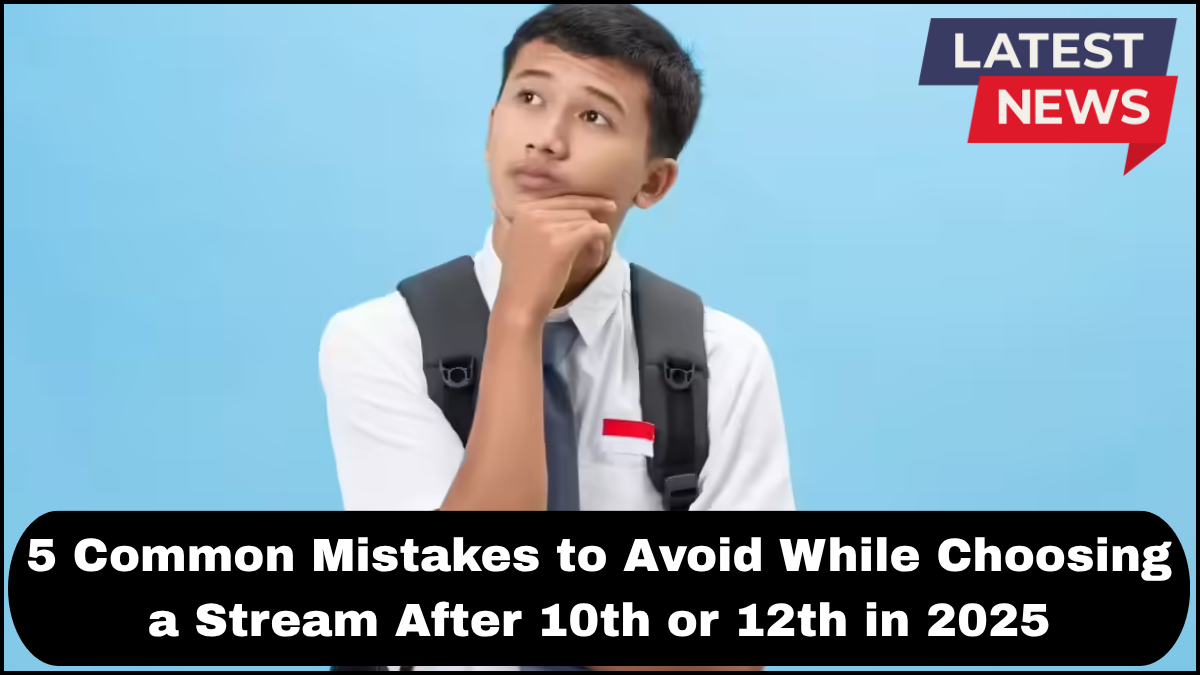Choosing the right academic stream after Class 10 or 12 is one of the most pivotal decisions in a student’s life. It lays the groundwork for future career options and personal growth. Yet, every year, thousands of students fall into common traps that can derail their potential and leave them confused or unfulfilled. To help you make a smarter choice, here are five key Mistakes to Avoid in Stream Selection, especially in 2025 where opportunities—and distractions—are more abundant than ever.

1. Giving in to Parental Pressure & Myths
One of the most widespread and damaging mistakes students make is surrendering to Parental Pressure & Myths surrounding specific streams. Parents may push children toward science or commerce due to outdated perceptions of job security or prestige.
For example, many believe that only science leads to successful careers like engineering or medicine. This is a myth. Today, humanities, design, and liberal arts offer equally rewarding and high-paying career paths. Careers in psychology, UX design, media, and public policy are booming, yet often overlooked due to misconceptions.
While parents mean well, decisions based solely on their preferences can cause long-term dissatisfaction. Students must explore their own strengths, aspirations, and personality traits. Engaging in open conversations with both parents and career counselors can bridge the gap between parental expectations and personal interests.
2. Ignoring Personal Interests and Aptitude
Ignoring what you enjoy or where your natural abilities lie is a serious mistake. Too often, students choose streams based on what their friends are doing or what seems trendy, rather than what aligns with their own interests.
A student who excels in creative writing but chooses science under peer pressure might struggle and lose motivation. On the other hand, a student who follows their passion—be it history, art, coding, or economics—will likely perform better and enjoy the journey.
Taking psychometric tests or aptitude assessments can help identify the right stream. Combine these results with academic performance and extracurricular involvement for a more informed decision.
3. Overlooking Career Trends and Future Scope
Failing to consider emerging fields and job market trends is another mistake. The world of work is evolving rapidly due to AI, automation, sustainability, and globalization. A stream that looked promising five years ago may not be as relevant in 2025.
For instance, careers in data science, environmental science, cybersecurity, and digital marketing are growing fast. Understanding how various streams connect to future-ready jobs can help students align their choices with the demands of tomorrow.
Explore real-world applications of subjects. Research industries that are expanding. Talk to professionals, not just teachers, to get a broader perspective.
4. Choosing a Stream Just Because It Seems Easier
Another common pitfall is choosing a stream based on perceived difficulty. Some students opt for commerce or humanities believing they are “easier” than science, without understanding the depth and rigor of each stream.
This attitude can backfire. Every stream has its own set of challenges, and underestimating them can lead to academic burnout or poor performance. Choosing a stream should never be about taking the path of least resistance but about choosing the path that best suits your goals and capabilities.
5. Not Seeking Professional Career Guidance
Many students and parents still rely on outdated advice from relatives or school teachers who may not be fully aware of current industry landscapes. Not consulting professional career counselors is a big mistake.
Career guidance experts can help you assess your interests, suggest suitable career paths, debunk myths, and provide updated information on colleges, entrance exams, and scholarship options. In 2025, with the increasing complexity of educational options, expert guidance isn’t a luxury—it’s a necessity.
You can also attend career webinars, workshops, and interactive Q&A sessions to gain deeper insights and connect with professionals across industries.
Final Thoughts
Stream selection is not just an academic decision—it’s a life decision. Avoiding these five common Mistakes in Stream Selection can prevent confusion, reduce stress, and lead to a more rewarding academic and professional journey. In 2025, where opportunities are broader but more specialized, the key lies in self-awareness, staying informed, and making thoughtful choices—not rushed ones based on pressure or hearsay.
FAQs
Q1. How do I know which stream is right for me after Class 10?
Start by assessing your interests, strengths, and academic performance. Take aptitude tests, speak with counselors, and research career paths linked to each stream.
Q2. What role do parents play in stream selection?
Parents offer support and guidance, but students should avoid selecting streams solely due to Parental Pressure & Myths. Honest conversations and mutual understanding are key.
Q3. Is it okay to switch streams after Class 11 or 12?
It’s possible but often comes with academic and logistical challenges. It’s better to make an informed choice upfront by avoiding common Mistakes in Stream Selection.
Q4. Are humanities a good option in 2025?
Absolutely. With career paths in law, design, psychology, public relations, and content creation booming, humanities offer diverse and respected opportunities.
Q5. Can I pursue science without wanting to become a doctor or engineer?
Yes. Science opens doors to careers in research, data analysis, biotechnology, environmental studies, and many interdisciplinary fields.
click here to learn more